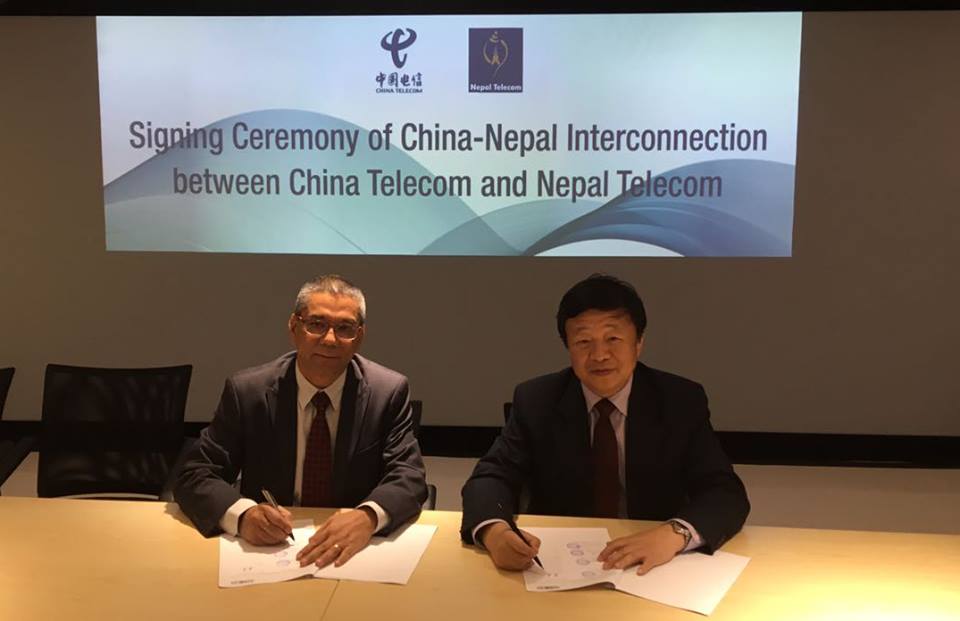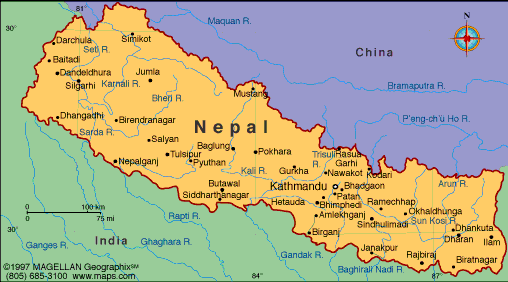Nepal-China strengthen ties
January 13, 2018 | Expert Insights

It was announced on January 12th, 2018, that China will become Nepal’s second internet service provider. Up until now Nepal depended on India for the internet access.
Is India’s influence on the tiny landlocked Himalayan country waning?
Background
Nepal traces its roots back to ancient civilization. A landlocked country in the Himalayas, the tiny nation shares a border with both India and China. An ancient culture, the nation was closed off from the rest of the world till 1950. Before that the Shah Dynasty had established the Kingdom of Nepal. It also formed an alliance with the British Empire, under its Rana dynasty of premiers. After it ended its isolation with the outside world, Nepal instituted Parliamentary democracy in 1951. In 2008, the Hindu monarchy came to an end after the Nepalese Civil War. Thus, it became a Republic. At the time, it was the oldest Hindu monarchy in the world.
Ties between India and Nepal have traditionally been good. Diplomatic ties were after the two nations signed the 1950 Indo-Nepal Treaty of Peace and Friendship. The two countries share close linguistic, marital, religious, and, cultural ties. The border between India and Nepal is an open boundary, people of the two nations come and go freely. Nepal is a land locked country with India on three sides and China on the northern border.
However, ties between the two nations have strained since 2015. There have been reports of anti-Indian sentiment growing among the citizens as well as the government. Additionally, in September 2015, the Nepali government accused India of imposing an undeclared blockade. This prevented trucks carrying perishables like fruits and vegetables to cross the border into Nepal. This caused an economic and a humanitarian crisis in Nepal. India denied that it had intentionally initiated the blockade. The two countries also have unresolved border issues.
The ties between Nepal and China were initially unenthusiastic. The trade ties have grown significantly since 1975. Since 2016, China has opened 32 border crossing points into Nepal. However, India continues to be Nepal’s key economic as well as security partner.

Analysis
Up until now, all of Nepal’s internet services were provided by India through three access points. However, this monopoly came to an end when country’s Information Minister Mohan Bahadur Basnet inaugurated a fibre optic link to China.
Previously, India’s Bharti Airtel and Tata Communications primarily provided internet services through the cities of Bhairahawa, Biratnagar and Birgunj in southern Nepal. The idea of creating another link to from China is not a new one for Nepal. In 2014, work had been completed on a new link. However, that was destroyed during the devastating 2015 earthquake in Nepal that resulted in widespread damage of the nation’s infrastructure.
“At present, China-Nepal relations are developing at the fastest pace we’ve seen,” said Yu Hong, Chinese ambassador to Nepal. George Varughese, Nepal representative of think tank the Asia Foundation said, “Nepal is trying to find a way to ensure manageable risk in terms of resources it gets from other countries. It is a good strategy to avoid being over reliant on any particular source, whether it’s China or India.”
India has extensive political and economic influence over Nepal and it provides much of Nepal’s supplies. China is also known for tightly monitoring its internet access and blocking multiple websites in its own nation. However, the Nepal link is connected to the Hong Kong, which is not affected by the “Great China Firewall.”
“This will give us an alternative to India for cyber connectivity and ensure uninterrupted connections,” Pratibha Vaidya, a Nepal Telecom spokeswoman, told Reuters. “Consumers can now look forward to a reliable service.”
Last year Nepal joined China’s flagship project – the One Belt One Road initiative.
Assessment
Our assessment is that India remains the main economic and security partner for Nepal. However, the image of India among Nepali citizens has been negatively affected in the recent years. The Indian government should be mindful that if China succeeds in replacing India as the key partner with regards to economy and security, then it would have well created a fissure at the Himalayan border that separates the Indian mainland from China. We believe that post earthquake that shook the Himalayan kingdom, the Indian influence has been less visible contrary to that of China. The recent victory by the Communist parties in Nepal is most likely to have provided the necessary impetus to this relationship.








Submitted by Air Mshl Dhira… (not verified) on Mon, 01/22/2018 - 10:06
Whatever has transpired
Whatever has transpired between the two nations, it is India that is at fault. Rightly said by you, the Nepali citizen views India as inimical towards his country.... notwithstanding the start in May 2014 and the relief provided in the aftermath of the earthquake. Somewhere, the political and bureaucracy lost the thread in controlling the Madhesi agitation....the undeclared blockade caused thereafter is the main reason for Nepali tilt towards China. Hopefully, relationship would improve now with the Elections being over and a stable government in place.... even though it is a Maoist Government.
Submitted by synergia on Sat, 09/07/2019 - 12:56
Thank you for your insight.
Thank you for your insight.